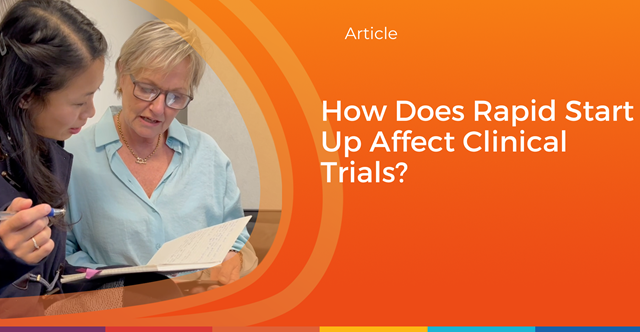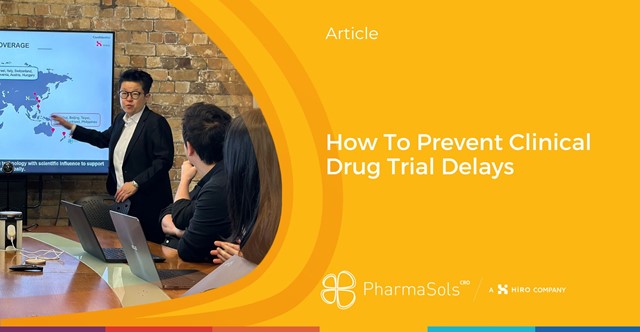16 Jan
How Does Rapid Start Up Affect Clinical Trials?

Fast, efficiently run trials benefit from gaining a competitive edge, a good reputation and credibility amongst stakeholders, as well as a period of exclusivity if the product is the first to be introduced to market.
Importantly, a rapid start up ensures that potential treatments reach the patients who need them most as soon as possible.
Recently, PhRMA indicated that a successful drug trial costs around $2.6 billion on average. The cost per day can fall anywhere between $600,000 and $8 million[1].
It makes sense then that the faster these processes can be achieved, the more cost-effective and efficient the trial will be.
What is a rapid start up?
‘Rapid start up’ refers to accelerating these processes and strategies to set up a clinical trial as quickly as possible without compromising quality and integrity. This includes expedited regulatory submissions, streamlined ethics processes, and prompt site selection and setup.
In many cases, multiple steps progress simultaneously instead of waiting for one stage to complete before starting on the next.
Why the ANZ region is the answer to achieving successful rapid start up
Australia and New Zealand (ANZ) have some of the fastest and most streamlined ethics and regulatory frameworks in the world. This means that the processes surrounding the study start up phase are far simpler than in the US or Europe, for example.
It makes sense then that global sponsors are looking to conduct trials in the ANZ region so that they can save time and money. According to cancer-fighting organisation BeiGene’s Commercial VP and Head of APAC, Adam Roach, the first patient into a clinical trial (after approvals) in Australia is, on average, about three months. In the US or EU, however, it’s six to nine months [2].
ANZ does not require an Investigational New Drug Application (IND), and full Good Manufacturing Practices (GMP) material is not mandated for Phase I clinical trials. Because of this, the regulatory timeline can be shortened by up to a year compared to the US.
Costs associated with regulatory and ethics submissions are also relatively low compared with many other regions.
Despite the speed at which the ANZ achieves start up, all regulatory and ethical processes are of an extremely high standard, ensuring quality trial data. Any clinical data collected in this region is accepted by other major regulatory bodies, such as the US Food and Drug Administration (FDA) and the European Medicines Agency (EMA).
It is also widely accepted that the ANZ region safeguards the interests of the organisations involved, as well as the wellbeing of the end-users.
Not only is ANZ a highly sought-after region to conduct a trial because it is reliable, more cost-effective, streamlined, and simpler, but the first patient will be enrolled faster than anywhere else in the world.
How can these benefits be leveraged?
Due to the region’s rapid approval process, Australia and New Zealand are especially sought after to run early-phase clinical trials. Early phase studies can be conducted in ANZ while finalising regulatory applications with the FDA and EMA for later phase clinical trials that take place in the US, Europe and China due to these countries’ vast populations.
Using the data collected from earlier approved ANZ trials, parallel submissions can lead to synchronised regulatory approvals in multiple regions.
This is a strategic move that saves a significant amount of time and money.
The advantages of choosing a local CRO
Wherever you are in the world, choosing a CRO who knows and understands the nuances of the region in which the trial is being conducted is highly beneficial.
Despite ANZ’s relatively straightforward regulatory processes, there are unique regional and cultural requirements that play vital roles in the application process.
Ideally, your chosen CRO should have strong, longstanding relationships with ethics and regulatory body representatives and be fully in touch with changes in the local industry. This would mean that local CROs will usually be notified about the availability for the ethics meetings, which would enable them to align the application submission accordingly, possibly preventing a two- to four-week delay in the entire process.
Harnessing the CRO’s established and trusted relationships with trial sites and local experts is also an invaluable benefit.
PharmaSols’ proven track record in successful rapid start up
PharmaSols has a dedicated rapid start up team, consisting of regulatory and clinical professionals with more than 20 years’ of experience in the ANZ clinical trial industry.
This team understands country-specific and regional regulations, enabling us to implement proactive solutions to potential challenges and accelerate the timelines from Trial Site selection to First Patient In.
We have robust relationships with most Trial Sites in Australia and New Zealand. Our knowledge of Trial Site experience, capabilities, facilities and historic performance enables us to complete feasibility and qualification more efficiently. We also offer our clients valuable insight as to which sites are best equipped to deliver excellent results for their study.
After receiving the protocol, PharmaSols submitted the ethics application to the New Zealand Ethics Committee within one working day.
Post-review, provisional approval was secured in 14 days. Considering the recommendations from the ethics committee, PharmaSols addressed and resubmitted the final application within nine working days. The committee then granted full approval just 20 working days after submission.
In total, PharmaSols efficiently navigated the ethics approval process in New Zealand, securing approval within 55 days of protocol receipt. The process was even faster in Australia; full approval was achieved in just 35 days of receiving the protocol.
Notably, PharmaSols went on to recruit almost twice as many patients as our global CRO partner over the three-month recruitment period.
PharmaSols
At PharmaSols, our Rapid Start Up team strategically leverages our advantageous position in the ANZ region. Our proven track record underscores the effectiveness of our approach, emphasising that clinical trials can be swift, efficient, and cost-effective whilst maintaining the highest standards of excellence.
Speak to our Rapid Start Up specialists to accelerate your upcoming study.
References
[1] Accelerating Study Start-Up: The Key to Avoiding Trial Delays (Online) Available at: https://acrpnet.org/2017/02/01/accelerating-study-start-up-the-key-to-avoiding-trial-delays/
Other News
March 2024 (1)
February 2024 (1)
December 2023 (1)
November 2023 (1)
October 2023 (1)
September 2023 (2)
August 2023 (1)
July 2023 (1)
June 2023 (2)
May 2023 (3)
April 2023 (1)
March 2023 (2)
The Go-to region for clinical trials (1)
HiRO – our global advantage, tailored solutions and key partnerships (1) (1)
HiRO – an emerging full-service global CRO (1)
HiRO – Top CRO in APAC 2022 (1) (1)
November 2022 (1)
October 2022 (1)
September 2022 (1)
August 2022 (1)
July 2022 (1)
June 2022 (1)
May 2022 (1)
April 2022 (1)
March 2022 (1)
January 2022 (1)
December 2021 (1)
November 2021 (1)
October 2021 (2)
September 2021 (2)
August 2021 (3)
July 2021 (3)
June 2021 (2)
May 2021 (1)
April 2021 (2)
March 2021 (1)
February 2021 (1)
December 2020 (5)
November 2020 (1)
October 2020 (5)
September 2020 (1)
August 2020 (2)
May 2020 (5)
January 2024 (0)


